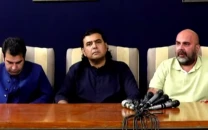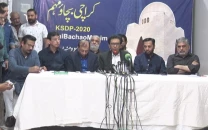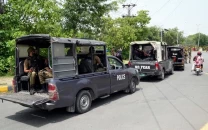Ignoring the white: Tales of lack of interfaith harmony resonate in capital
PIPS holds screenings of documentaries, telefilms on peaceful coexistence.

She only shared her anecdote after asking the organisers to dim the lights, as she did not want to be seen crying. “As a student, I was not allowed to touch the teacup of my teacher, nor any other utensils. I didn’t understand this at the time,” she said, adding that “I finally understood in 9th grade when my science teacher announced that she would not allow any Christians in her classroom that it was my faith that they despised.”
However, after consultation with some senior teachers, I was provided space in the class, recalled Bashir, saying “I was allowed to stand in a corner during science class. There were chairs, but just not for me.”
While sharing her distressing story, Bashir said, “It was a very difficult period of my life. I would cry every night in bed.” During those sleepless nights, Bashir decided that she would work for advocating harmony and religious coexistence among people of other faiths and eventually became a human rights activist.
When she decided to teach ‘peace building courses,’ Bashir was given death threats and asked to leave her homeland. But she decided otherwise. “In order to teach others, it is imperative that some people remain faithful till the end,” she said. “My hope is still alive,” stated Bashir, who is now the chief executive of the Peace and Development Foundation.
Bashir’s emotionally charged tale brought moved the audience as they witnessed a combination of various characters of the telefilm in the shape of her own story.
The head of the Press and Cultural Section of the Embassy of Germany, Dr Dan Tidten, admitted his Urdu was limited but the telefilm made him cry.
The screening took another turn when a forgotten chapter of history was revived through a documentary --- Our Own Heroes. Have we forgotten the great Pakistanis, Diwan Bahadur Sataya Prakash Singha, commonly known as SP Singha, and group captain (retd) Cecil Chaudhry, were the core questions of the documentary.
When the vote for joining Pakistan was tied in the Punjab Assembly, and the casting vote was with Punjab Assembly Speaker SP Singha, his choice of Pakistan was what led West Punjab to join Pakistan.
Despite their great roles, citizens of other faiths have not been given the respect, facilities and equal rights they deserve for the last seven decades, opined speakers at the event. Incidents of forced conversions, attacks on minorities, mob violence over alleged blasphemy, issues of bonded labour and related issues have become frequent, it was noted.
A speaker said the white part in the Pakistani flag represents minorities and peace. He, however, said both things have been dangerously ignored since independence.
PIPS Director Muhammad Amir Rana, along with the rights activists spoke at the event.
Two documentaries — ‘On the Edge’ dealing with core issues of minorities and ‘The City Lost in History’ (Taxila) — were also screened at the event.
Published in The Express Tribune, December 4th, 2014.



















COMMENTS
Comments are moderated and generally will be posted if they are on-topic and not abusive.
For more information, please see our Comments FAQ